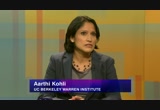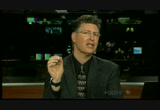tv This Week in Northern California PBS December 14, 2012 7:30pm-8:00pm PST
7:30 pm
good evening. welcome to "this week in northern california." i'm uyl quan. tonight, our thoughts and prayers are with the families affected by the school shooting in newtown, connecticut. now, to help those of you who would like to talk about the incident with your children, we provided a link to some useful resources on our website. we hope it can be of some help today in the wake of this devastating tragedy. we move now to tonight's discussion. and joining me on the panel are aarti kohli, senior fellow at uc berkeley's warren institute on war and social policy.
7:31 pm
paul rogers, environmental writer with the "san jose mercury news." stephen sock, investigative reporter with nbc bay area. and from los angeles, david lazarus, columnist with "the l.a. times." aurti, let's start with you. uc berkeley announced a new scholarship program for undocumented students. why did the university feel it was necessary to support these students? >> well, yes it's very excites news. $1 million from the foundation. and the university really feels strong obligation to these students because they're one of the most vulnerable set of students that we have. the average family income for these students is $24,000 a year. they're not eligible for federal financial aid. they're not eligible for pell grants. and so they've overcome great odds just to get to berkeley and we want to keep them as our chancellor, chancellor burgeneaux, who's been an amazing leader on this issue,
7:32 pm
has said we can't afford to lose this talent in california and we want to keep it here. not only are we offering financial aid, we're actually building a comprehensive support system for them. and we have an academic counselor, a lending library, legal support, all the things that they really need and what's great is that this is a model that we're hoping that other universities are going to start following as well. >> now, this is just the latest kind of development in a larger debate over immigration reform. now, the house of representatives passed a s.t.e.m. jobs act. them me more about what the job does and why does the obama administration not support it? >> so the s.t.e.m. bill is a bill which takes visas from what's called the diversity lottery, which is a great pr program where actually it's a lottery for green cards in the u.s. it takes those 55,000 visas and says we're going to get rid of lottery and make those visas
7:33 pm
available for people who have advanced degrees in science, technology, engineering, math. and it's the only bill that the republicans have been willing to pass out of the house. and what the democrats, interestingly enough, the democrats and the president have really stood firm on this. they support the underlying legislation. they don't want to get rid of the diversity lottery. they think we can do both. but they think it needs to be part of a bigger package. >> okay. >> what's being called comprehensive immigration reform. that's really not just about these taxes, that's about legalizing the 11 million undocumented immigrants in this country, giving them a pass to earn citizenship. that's about fixing broken laws that make it really hard even for legal immigrants. and it's about fixing the future flow, because really we haven't set up a system so that people can immigrate here lawfully which is why we have so many
7:34 pm
undocumented immigrants. >> let me ask you about the prospects for the big change next year in 2013. obviously this was a hot topic with the presidential race. latinos and asians both voted 70% to 30% for obama. and i think you can document in several states, colorado in particular, that that was the difference. do you think that there is enough concern from the republican side that they'll go for a big overhaul finally this time? or are the sort of tea party wing of the caucus going to block them from doing anything big? >> i think the signs are showing that there is enough concern because lamar smith, who has been very restrictionist on this issue, is no longer going to be chair of the judiciary committee. they're moving people around. you an kind of see from some of that movement that they want someone who's going to -- they want people who are willing to make a deal. i think on the senate side it's going to be a little bit easier. you've got lindsey graham,
7:35 pm
mccain, some people who have already come to the table before. it's the house that's going to be the bigger challenge because you still have -- >> i wanted to follow what paul said, talking to some sources on capitol hill within the democratic party before the election. they say, they tell me that they were worried this proved a vulnerability and they didn't want to sort of get out in front of this because of the fear of losing a state like colorado, or certainly they lost arizona, but that the political calculous. now that president obama has won a second term, you see the mood shifting from the democratic side, and perhaps the president using his bully pulpit to more effect and essentially pushing this legislation a little more aggressively than he has in the past. >> completely. and the thing is this is the kind of bill that you have to have leadership on. it's not the kind of bill that people just kind of sing kumbaya and come together. it's a tough fight. and so without leadership, we're not going to be able to get it done. and i think the president and the democrats realize that the
7:36 pm
ball's in their court. and they have to, you know, they have to take and run with it. >> let's take a question from david. david, you there? >> caller: yeah, i'm here. i'm just wondering about the perception among primarily latinos but also asian-americans as to the sincerity of the republicans. they're sort of johnnys come lately when itle comes to immigration. as we just heard, this election result is still stinging for them. they're keen to embrace this and keen to embrace the social conservatism of the latino community. >> right. >> yet i wonder if latinos are going to say, you know what, we'll take it, we'll take any love at this point. >> yeah. i mean, i think there isn't a -- you can't say latinos and speak for all latinos. there are evangelical latinos who are naturally conservative republicans, and, but also care very deeply about immigration. and i think the republicans are beginning to realize in states
7:37 pm
like texas and colorado, that they, if they do the right thing on immigration, they actually may be able to survive. but if they don't do the right thing on immigration, they're going to lose even people who might be their natural constituency. >> yeah, they don't need to win a majority of latinos to win the white house. i mean, in colorado, they lost 70-30. if it would have been 60-40, they would have won the state. >> or florida. a huge electoral state. >> marco rubio now is sort of trying to woo the republican right from the latino perspective. >> right. latinos are also, i mean, it's not an electorate that's, you know, stupid. this is an electorate that can see through what are sometimes these fake bills that offer something but not a whole lot. >> all right. fascinating discussion. thank you so much, aarti. let's turn to the debate over the oil and gas extraction
quote
7:38 pm
method known as fracking. 18,000
7:39 pm
california's division of oil, gas
7:40 pm
voluntarily reported 628 fracking wells statewide. >> we don't know exactly how much liquid water is being used. we don't know the types of chemicals that are being mixed in the water. you don't know any of that other than what may be told to you voluntarily. >> that is correct. we don't know exactly how many wells. >> that is correct. >> reporter: he expects that to all change now as his office finally has begun the process of adopting new rules to regulate and monitor all fracking in the state. >> so stephen, when are the new regulations on fracking coming out and how will they change the way oil and gas companies operate? >> great question. they were supposed to be out already. our sources within the division of oil, gas and geothermal resources tell us they should be out before christmas. now, these will be administrative rules that are promulgated by administrative office through the governor. and essentially what it will do will require the oil and gas
7:41 pm
industry to report when they frack, what kind of chemicals they use to frack, what kind of water, where the water goes and how it's used and how it's disposed of once it's done being used. >> have there been environmental or health issues reported in california related to fracking? >> great question. again, the real concern here is here in california, fracking is used to recover oil, to get at oil versus natural gas in pennsylvania, ohio, new york, where a lot of these problems have popped out. the oil and gas industry folks that we talk to continue to repeat again and again, there are no records of any problems with fracking here in the state. but because they're not being tracked, because we don't know exactly what's happening, you can't make a blanket statement and say that other than we don't knowrepercussions so far. >> if i may -- >> voluntary regulations.
7:42 pm
i always ask if we had a voluntary speed limit on the highway, how fast would people drive? the question is about this monterey formation. these are beautiful rolling hills south of the salinas valley and the lockwood area. >> that's right. >> this is not an area, though, that's had a whole lot of drilling. as you've pointed out, it's not the same as other parts of the state because the geology is tricky with fault lines and things. how likely do you think it is we're going to see a boom down there versus a few people experimenting and coming up not very economically fweeasible? >> another great question. our first report, we talked to a gentleman who lived in monterey and where there was a fracking well next door and they had actually gone under his land. i've got to say, paul, because there is so much there, the federal government has confirmed this is the largest onshore shale formation with oil in the country. the potential is there to provide oil for the united
7:43 pm
states through ten years as great as saudi arabia. because of those pressures, paul, i've got to think that there is going to be fracking in these beautiful pristine areas. in fact, several oil and gas companies were able to bid and successfully get some of these leases for as little as $2.50 an acre which is hard to believe considering in kern county it's much, much more than that. where, of course, we know there's oil and right now, they're extracting oil through conventional means. >> david, you have a question? >> yeah. it's just, i mean, it's understandable that there's these financial incentives for industry to want to pursue fracking as aggressively as they can, but it seems as though we just don't know enough about the environmental/health impacts of this. it defies belief that pumping chemicals into the ground somehow is not going to get into the water supply. are we comfortable that enough is known about this process to allow industry to proceed at such a manic clip?
7:44 pm
>> absolutely not, david. that's the point of our story. there are some groups who want to stop oil fracking in california. that wasn't the point of our investigation. it was we need to know more. the scientists need to know more. we talked to geological folks with the usgs who tell us fracking causes earthquakes, small earthquakes but earthquakes nonetheless. have we studied that? no. do we know exactly what's going into the water and whether the water gets to our drinking -- no. we're just not studying it. we turned a blind eye here in california which i find ironic, david, that california which is known as a progressive environmental state doesn't know anything about fracking right now. and if you've talked to the folks in sacramento, that's going to change. but so far, it hasn't. >> all right. thank you so much, stephen. all right. let's talk about a more familiar industry that many of us will be dealing with over the holidays. air travel. but what may not be so familiar are the new ways airlines are racking up fees. david, you've been reporting on
7:45 pm
this and what kind of changes are you seeing? >> i think passengers can expect to be increasingly fracked as they're traveling simply because the fees will keep piling up. today we had southwest airlines coming out with a new fee. southwest is one of the very few of the big boys who did not charge you a change fee if you needed to change a booking. most of the other airlines will charge 150 bucks for that. now southwest says beginning next year, they haven't said how much they're going to charge, but they will charge a fee if you don't show up for a flight. this is new for southwest. meanwhile, also this week, we also had americanairlines unveiling a fairly radical new fee structure whereby coach passengers will have three different tiers to choose from. a basic bare bones no frills tier, where extras will be added on, and a new tier that will cost $68 more where you'll be able to dodge the $150 change fee if you had to change and
7:46 pm
check a free bag each way. that will receive you 25 bucks per leg. for an extra $88 on top of the normal coach ticket, you get the $150 fee waiver, baggage waiver plus get free booze on the flight. what does the traveler need to know about this? basically american collected about $1 billion last year in change and baggage fees. what they seem to be gambling on is that they're going to make more money by offering this fee and look at it, the $25 baggage fee, for example. if you go for an extra 68 bucks upgrade here, that's $50 there. there's your baggage fee. american is figuring another 18 bucks on top of that to avoid the possibility of the $150 change fee, people will jump at it. what they're not saying is the $150 change fee is simply unconscionable. moreover, they're overbooking most of their flights anyway. it's not the biggest inconvenience for them if you do have to change. kind of what they're doing is saying, well, we're going to try and offer you protection.
7:47 pm
if tony soprano did this, we'd call it protection money. >> my head is spinning, david. why are they charging so many fees? why don't they just increase the price of the ticket? >> that is a very good question. certainly consumers have been wanting to do that, just like with cell phones, for example. consumers want to see more transparentsy in cell phone prices. don't give us the nick and dime fees but a base to comparison shop. ditto with airlines. the airlines know full well the consumers shop first and foremost based on price. far and away the largest determinate in picking out an airline ticket so they break out as much as they can to bring that base price lower. here's also a dirty little secret that not a lot of people might know. airlines have to pay a higher tax to uncle sam for all the tickets that they sell. the key tickets. but all of those extra fees and things, they're not subject to the same tax rate. they are taxed at a much lower rate. therefore, the airlines have a very profound financial incentive to break out as much of this into fees because that
7:48 pm
means that's less tax revenue being lost to the government. >> fascinating. >> david, how is the industry doing overall? i mean, are they recovering from the bad economy? and is this, like, generating huge profits? or are they doing this because they're struggling? >> they're struggling. these are tough times for the airline industry. fuel costs are a huge factor here. about 30% of your typical ticket is going to be reflected in fuel costs. and so as we see oil prices going up, as the global economy recovers, and they will, inevitably we've seen ticket prices going up as well. nevertheless, we see the losses continuing to mount. americanairlines, which we were just talking about, still struggling its way after a year of its parent company being in bankruptcy protection. now us airways is kicking the tires for a potential acquisition of american, which will simply mean less competition in the marketplace and, well, you know what that means for prices. >> david, you know, i hate these fees. you hate these fees.
7:49 pm
most consumers hate them. when i talk to the people in the airlines, as you alluded to, american making $1 billion. they're making so much money off this. there's no way they're going to get rid of these fees, are they? >> no, they're not going to walk away from fees. the fee income is too important, just like with banks, for example. we've been seeing a greater percentage of their revenue coming from fees and so they're very reluctant to walk away from the fee structure as well. it's very tricky for consumers. not least of which gets increasingly hard to comparison shop. for example, if you go to expedia and book an americanairlines ticket there, you can't pick a seat there. you then need to go back to the americanairlines website to pick your seat. >> if you're at a window or something, you have to pay more, right? i saw you have to pay more. >> yeah, exactly. you might have to pay an extra $42 and now they're introducing other tiers that would require these upgrades as well. i think it's just a matter of time before there's going to be standing room on these flights. i know that the faa -- i'm not
7:50 pm
kidding. i couldn't make this up if i tried. in fact, over in england, they're already examining this as a possibility. the airlines, there's no danger here whatsoever. takeoffs and landings, piece of cake. i'm thinking to myself, wait a minute, i've seen a lot of footage of really scary -- >> i can't wait until they start charging for you to use the bathroom. bring a lot of quarters. >> you know that's inevitable, too. you didn't have to travel far to see a spectacular natural phenomenon happening along our shores this week. paul, tell us about king tides and what are they getting people so excited? >> these are the highest tides of the year. and if you remember back to your high school science class, tides are caused by the gravitational pull of the moon. what happens is, the moon doesn't go in a circular orbit around the earth. it orbits every 29 days in an elliptic orbit. sometimes the moon is closer to the earth than other times. when it's closer, there's a greater gravitational pull. and the moon is pulling the water, causing a bulge
7:51 pm
basically, in the ocean which causes the tides. and this week, wednesday, peaking on thursday, and also friday, the tides were several feet higher in most places than they were throughout the rest of the year. we had some minor flooding on the embacadaro in san francisco, lake valley, around lake merr t merritt. basically it was a great opportunity to do tide pooling as well because the high is higher than normal, but the low is much lower than normal. so the people who got out and went to places like fitzgerald marine reserve on the san mateo coast, you could walk much, much further out at low tide. hundreds of yards further than you otherwise would have been able to. it was a great opportunity to teach your kids about, you know, star fish and all the other critters out there. >> will the severity of the king tides be exacerbated by global warming, any time? >> you know, it's interesting,
7:52 pm
because i think hurricane sandy really woke a lot of people up about the risk of rising sea level in the future for coastal communities. 75% of california residents live within an hour of the coast. and, you know, basically the ocean has already risen eight inches in the last 100 years. we can measure that by the tidal gauge at ft. point in san francisco which has sat there more than 100 years. the same gauge, the same water. these are not al gore's theories. these are measurable phenomenon, empirical data. as the ocean continues to rise, we're going to see more days like these high water events. so there's a non-profit group called the california king tides initiative. and there are similar ones in oregon, washington, british columbia, that asks people to go out and photograph this phenomena before and after and post it on websites so you can see what the future is going to be like. >> david, you had a question? >> yeah, we also had some flooding down here because of the king tides.
7:53 pm
paul, i'm wondering about how do you stem the tide, as it were, in terms of climate change? we have wealthy homeowners in malibu and elsewhere in southern california who are out of their own pocket trying to restore beaches before their beachfront homes wash away. are we expecting california to provide subsidies or any sort of effort to try and preserve coastal communities? >> basically, no, is the answer, because you can't stop the ocean. and, you know, there was a report by the national academy of sciences that came out this summer showing that at the current rate, the ocean is going to rise as much as one foot by 2030. that's not really that long from now when you think about it. that's 18 years. it's going to rise as much as two feet by 2050. and as much as five feet by 2100. when you think about san francisco bay, five feet is amazing. the runways at san francisco airport, oakland airport, will be under water. the san francisco giants will have to build major flood walls
7:54 pm
around the ballpark so the center field doesn't fill up with fish at high tide. and then, you know, not only that, the question is, who pays for all this? there's going to come a point where they do what's called manage retreat. we're already seeing it in some places where if your apartment building or house is starting to fall into the ocean, it's too bad basically. you have to move it backwards. and they're not going, you know, the coastal commission and other agencies are not going to give as many permits or any, frankly, for building close to the ocean or the bay anymore. >> you mentioned al gore, which alludes to the whole politics around climate change. i find it ironic that now the science is catching up. or the reality is catching up to what the scientists told us 20 years ago. it's too late, whether we believe it or not anymore, isn't it? >> that's right. the only question now with climate change is how severe is it going to be? we still have time to lessen the impact. think of the big storms like sandy. you know, that's where it really gets bad. a few inches of ocean rise normally isn't too bad, but if
7:55 pm
it's a couple feet, you're going to have bad problems. we can make changes and lessen the damage. >> thank you, paul. that's our show for tonight. i want to thank or guests for joining us tonight. we hope you'll visit our website kqed.org/thisweek to watch complete episodes, subscribe to our newsletter and pod cast and share your thoughts about the show. next week, tune in for seat and harvest, a look at the impact of climate change on agriculture in california. i'm uyl quan. good night.
7:59 pm
gwen: shock and tears from a small town in connecticut to the white house, tonight on "washington week." another mass shooting. a visibly shaken president. >> the majority of those who died today were children. beautiful kids between the ages of 5 and 10 years old. they had their entire lives ahead of them, birthdays, they had their entire lives ahead of them, birthdays, graduations
689 Views
3 Favorites
IN COLLECTIONS
KQED (PBS) Television Archive
Television Archive  Television Archive News Search Service
Television Archive News Search Service 
Uploaded by TV Archive on

 Live Music Archive
Live Music Archive Librivox Free Audio
Librivox Free Audio Metropolitan Museum
Metropolitan Museum Cleveland Museum of Art
Cleveland Museum of Art Internet Arcade
Internet Arcade Console Living Room
Console Living Room Books to Borrow
Books to Borrow Open Library
Open Library TV News
TV News Understanding 9/11
Understanding 9/11




























